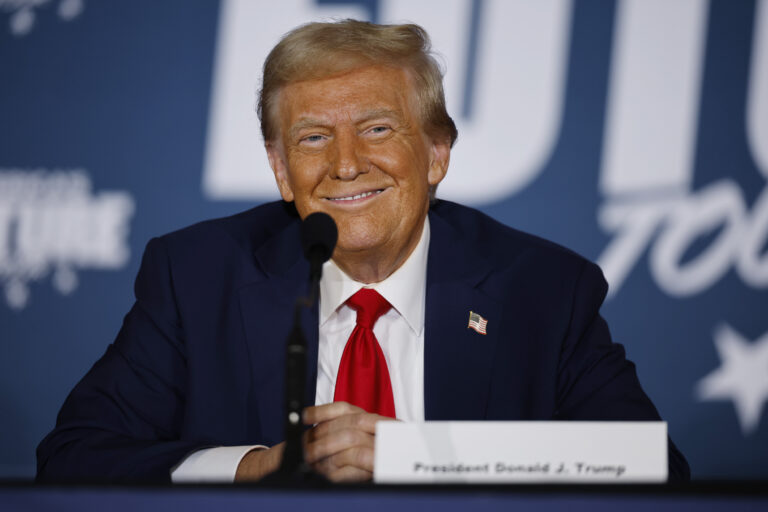What Does Donald Trump’s Win Mean for America? Newsweek Writers’ Verdicts
Donald Trump has won the 2024 Presidential Election, delivering a victory speech in the early hours of Wednesday morning. The Republican will become the 47th President. Newsweek writers give their verdicts on what the result means for America and the world—plus have your say in the comment form below.
Bethany Mandel
I was reliably informed that this election would determine the future of American democracy. I was told this by a party that perpetrated a coup against their candidate, installing a new one a mere three months ago. The new candidate did not receive a single primary vote. The other guy, the one they claimed was the threat to democracy, was on the receiving end of a torrent of legal cases meant to prevent him from running, and potentially even imprisoning him. Someone even shot him in the head. It’s weird the American people didn’t buy any of it. Democrats have earned their exile. The people have spoken. This is what democracy looks like.
Bethany Mandel is co-author of Stolen Youth
Paul du Quenoy
Tonight the nation rejected the first DEI candidate for the presidency, a ridiculous and unqualified woman chosen solely for her race and gender whose only argument was that she was not Donald Trump. That argument failed, and in the end she could not dodge the glaring fact that she, and not Trump, was the unpopular incumbent and that she, and not the once and future president, is responsible for national ills so grave that 72 percent of Americans told exit pollsters that they are either angry or disappointed with the depraved depths to which she and the senile and incompetent Joe Biden reduced our country and world. It was entirely predictable that she would lose and deliver the Senate to Republican control while she was on her way down. For voters who saw through her vacuous billion-dollar campaign and the slimy legacy media’s smoke screen, it is morning in America again. Trump is their retribution.
Paul du Quenoy is President of the Palm Beach Freedom Institute
Arick Wierson
Much of the world is waking up today perplexed by the American electorate’s decision to hand Donald Trump a return pass to the White House. His anti-globalist “American First” agenda will force European leaders to reassess long-standing security arrangements with the U.S. Look for Trump to move quickly to make good on his promise to wind down the war in Ukraine, likely by forcing Zelensky’s hand to make concessions to Putin. Trump will give Netanyahu carte blanche to prosecute the wars against Hamas and Hezbollah with even fewer guardrails. The next four years will mark a radical departure in U.S. foreign policy and trigger significant realignment to the international world order.
Arick Wierson is a six-time Emmy award-winning Television Producer
Patrick T. Brown
In 2015, The Onion published a mock op-ed from Donald Trump. The headline: “Admit It: You People Want to See How Far This Goes, Don’t You?” Ever since—the shock of 2016, the comeback after his unprincipled postelection conduct, this year’s assassination attempts—it seems like the American people, if not the hand of the Almighty, have ensured the answer continues to be ‘yes.’ The Democrats have proved themselves unable to adjust to the predominant political dynamic today—a ongoing realignment along educational lines. Their inability to drop the lingo of the college campus and take working-class voters’ concerns seriously was his gain, and former—and future—President Donald Trump will remain the main character in our collective political dramas throughout his second term in office.
Patrick T. Brown is a Fellow at The Ethics and Public Policy Center
Daniel R. DePetris
The first time Donald Trump won the presidency in 2016, the world woke up the next morning in a collective state of shock. Nobody expected it. Eight years later, with Trump again claiming the White House, the world is far more prepared. Foreign diplomats, particularly in Europe and Asia, have spent well over a year trying to rekindle relationships with Trump’s circle to better understand what the foreign policy goals will be during a second Trump presidency and to reiterate a desire to strengthen relations with the United States. Ultimately, though, all of this will come down Trump’s own priorities. At the top of the list is ending the war in Ukraine, which Trump clearly believes the Ukrainians can’t win and one that has sucked up about $175 billion in U.S. taxpayer money over nearly three years. Any chance of a settlement will entail some very tough conversations with Ukrainian President Volodymyr Zelensky and even tougher ones with Russian President Vladimir Putin, who remains a pariah in the West. Hard compromises will be required from each and maximalism will need to be left at the door. Whether Trump succeeds or fails—and just as importantly, how he succeeds or fails—will in part determine how impactful he will turn out to be on the international stage.
Daniel R. DePetris is a Fellow at Defense Priorities
Aron Solomon
The U.S. election result has a big impact at home and around the world. Domestically, it sets the tone for things like the economy, health care, climate action, and social issues. The direction the new leadership takes will affect people’s daily lives, from job opportunities to environmental policies. Globally, America’s approach to foreign policy and international challenges influences everything from trade deals to global security and climate agreements. Other countries will pay remarkably close attention, adjusting to new alliances or tensions. Overall, the election outcome shapes how the U.S. interacts with the world and how it manages its own big issues.
Aron Solomon is a legal analyst
Jonathan Tobin
Donald Trump has been elected president again because the future of American democracy was not on the ballot in 2024. What was on the ballot was the record of a failed administration led by President Joe Biden and Democratic candidate Vice President Kamala Harris. As it turned out, a majority of Americans didn’t buy the smear that Trump was an authoritarian or a Nazi or that the only thing mattered in determining our future as a nation was a Capitol riot that was falsely inflated into an “insurrection.” What they cared about was Biden/Harris’ open borders, inflationary economics and a policy of defeat and chaos abroad, all of which made Trump’s first term look like a golden age by comparison. And if they were worried about democracy, it was the Democrats’ lawfare against Trump and free speech that concerned them. More than that, the election demonstrated that the realignment of American politics in which the GOP became the party of the working class and the Democrats the standard-bearers of the credentialed elites, was a formula for a decisive Trump victory.
Jonathan Tobin is editor-in-chief of JNS.org








